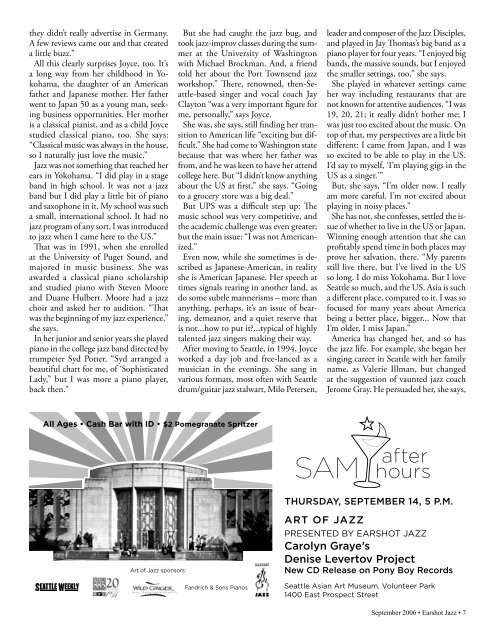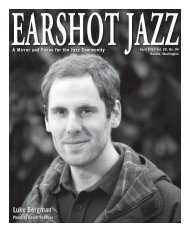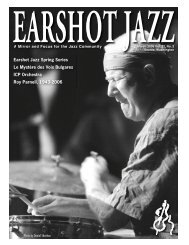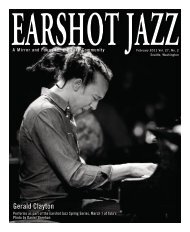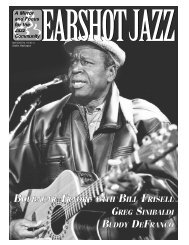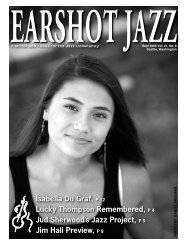Valerie Joyce Pony Boy's Day Out Festival Preview ... - Earshot Jazz
Valerie Joyce Pony Boy's Day Out Festival Preview ... - Earshot Jazz
Valerie Joyce Pony Boy's Day Out Festival Preview ... - Earshot Jazz
Create successful ePaper yourself
Turn your PDF publications into a flip-book with our unique Google optimized e-Paper software.
they didn’t really advertise in Germany.<br />
A few reviews came out and that created<br />
a little buzz.”<br />
All this clearly surprises <strong>Joyce</strong>, too. It’s<br />
a long way from her childhood in Yokohama,<br />
the daughter of an American<br />
father and Japanese mother. Her father<br />
went to Japan 50 as a young man, seeking<br />
business opportunities. Her mother<br />
is a classical pianist, and as a child <strong>Joyce</strong><br />
studied classical piano, too. She says:<br />
“Classical music was always in the house,<br />
so I naturally just love the music.”<br />
<strong>Jazz</strong> was not something that reached her<br />
ears in Yokohama. “I did play in a stage<br />
band in high school. It was not a jazz<br />
band but I did play a little bit of piano<br />
and saxophone in it. My school was such<br />
a small, international school. It had no<br />
jazz program of any sort. I was introduced<br />
to jazz when I came here to the US.”<br />
That was in 1991, when she enrolled<br />
at the University of Puget Sound, and<br />
majored in music business. She was<br />
awarded a classical piano scholarship<br />
and studied piano with Steven Moore<br />
and Duane Hulbert. Moore had a jazz<br />
choir and asked her to audition. “That<br />
was the beginning of my jazz experience,”<br />
she says.<br />
In her junior and senior years she played<br />
piano in the college jazz band directed by<br />
trumpeter Syd Potter. “Syd arranged a<br />
beautiful chart for me, of ‘Sophisticated<br />
Lady,” but I was more a piano player,<br />
back then.”<br />
������������������������<br />
��������������������� ����������������������<br />
But she had caught the jazz bug, and<br />
took jazz-improv classes during the summer<br />
at the University of Washington<br />
with Michael Brockman. And, a friend<br />
told her about the Port Townsend jazz<br />
workshop.” There, renowned, then-Seattle-based<br />
singer and vocal coach Jay<br />
Clayton “was a very important figure for<br />
me, personally,” says <strong>Joyce</strong>.<br />
She was, she says, still finding her transition<br />
to American life “exciting but difficult.”<br />
She had come to Washington state<br />
because that was where her father was<br />
from, and he was keen to have her attend<br />
college here. But “I didn’t know anything<br />
about the US at first,” she says. “Going<br />
to a grocery store was a big deal.”<br />
But UPS was a difficult step up: The<br />
music school was very competitive, and<br />
the academic challenge was even greater;<br />
but the main issue: “I was not Americanized.”<br />
Even now, while she sometimes is described<br />
as Japanese-American, in reality<br />
she is American Japanese. Her speech at<br />
times signals rearing in another land, as<br />
do some subtle mannerisms – more than<br />
anything, perhaps, it’s an issue of bearing,<br />
demeanor, and a quiet reserve that<br />
is not...how to put it?...typical of highly<br />
talented jazz singers making their way.<br />
After moving to Seattle, in 1994, <strong>Joyce</strong><br />
worked a day job and free-lanced as a<br />
musician in the evenings. She sang in<br />
various formats, most often with Seattle<br />
drum/guitar jazz stalwart, Milo Petersen,<br />
�����������������������������������������������������<br />
�������������������<br />
��������������������<br />
����������������������<br />
leader and composer of the <strong>Jazz</strong> Disciples,<br />
and played in Jay Thomas’s big band as a<br />
piano player for four years. “I enjoyed big<br />
bands, the massive sounds, but I enjoyed<br />
the smaller settings, too,” she says.<br />
She played in whatever settings came<br />
her way including restaurants that are<br />
not known for attentive audiences. “I was<br />
19, 20, 21; it really didn’t bother me; I<br />
was just too excited about the music. On<br />
top of that, my perspectives are a little bit<br />
different: I came from Japan, and I was<br />
so excited to be able to play in the US.<br />
I’d say to myself, ‘I’m playing gigs in the<br />
US as a singer.’”<br />
But, she says, “I’m older now. I really<br />
am more careful. I’m not excited about<br />
playing in noisy places.”<br />
She has not, she confesses, settled the issue<br />
of whether to live in the US or Japan.<br />
Winning enough attention that she can<br />
profitably spend time in both places may<br />
prove her salvation, there. “My parents<br />
still live there, but I’ve lived in the US<br />
so long. I do miss Yokohama. But I love<br />
Seattle so much, and the US. Asia is such<br />
a different place, compared to it. I was so<br />
focused for many years about America<br />
being a better place, bigger... Now that<br />
I’m older, I miss Japan.”<br />
America has changed her, and so has<br />
the jazz life. For example, she began her<br />
singing career in Seattle with her family<br />
name, as <strong>Valerie</strong> Illman, but changed<br />
at the suggestion of vaunted jazz coach<br />
Jerome Gray. He persuaded her, she says,<br />
������������������������������<br />
�����������<br />
�������������������������<br />
����������������<br />
�����������������������<br />
����������������������������������<br />
����������������������������������������<br />
�������������������������<br />
September 2006 • <strong>Earshot</strong> <strong>Jazz</strong> • 7


